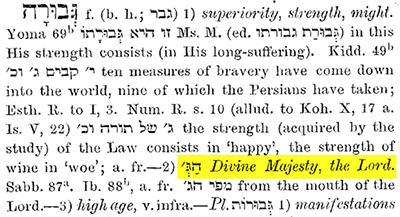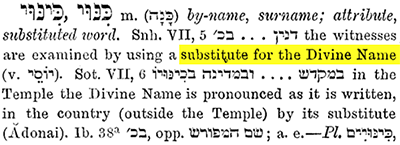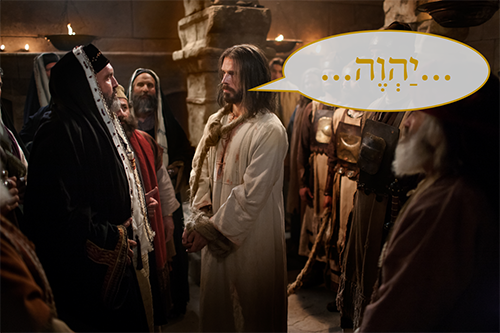If we take Matthew’s text at face value, there wasn’t anything blasphemous about Jesus’ statement to Caiaphas:
64 “It is as you said. Nevertheless, I say to you, hereafter you will see the Son of Man sitting at the right hand of the Power, and coming on the clouds of heaven.” NKJV, ©1982
The Jewish Encyclopedia says the following concerning “blasphemy”:1
Evil or profane speaking of God. The essence of the crime consists in the impious purpose in using the words, and does not necessarily include the performance of any desecrating act.
The Jewish law is based on the case of the blasphemer, one of the mixed multitude that went out of Egypt with the children of Israel (Lev. xxiv. 10–23). He blasphemed the name of the Lord and cursed; was sentenced to be taken without the camp; and it was decreed that all who heard him should lay their hands upon his head, and that all the congregation should stone him. The judgment in his case was formulated in a general law in verses 15 and 16.
However, it adds the following:
The term “we-noḳeb shem YHWH,” used in verse 16 ("And he that blasphemeth the name of the Lord," A. V.), does not seem to signify that the mere pronunciation of the Ineffable Name was considered blasphemy, but that it was blasphemous to curse or revile the same. The later law, however, took the word “noḳeb” in the sense of “pronouncing,” and declared that the Ineffable Name must have been pronounced before the offender could be subjected to the punishment provided by the Law.
The Talmud states, ההוגה את השם באותיותי—“He who pronounces the Name by its letters” has no portion in the world to come.2 But, even in that statement that Jesus spoke just before Caipahas accused him of blasphemy, there isn’t any mention of the Tetragrammaton...or is there?
If Matthew is accurate, Jesus said a declension of the Greek word δύναμις, which if Jesus spoke Aramaic, he would have said גְבוּרָא (gevura), equivalent to the Hebrew גְּבוּרָה (gevura). According to Jastrow,3

Hence, the Hebrew word גְּבוּרָה and Aramaic word גְבוּרָא were spoken (or written) as circumlocutions or כִּינּוּיִים (kinnuim)4 for the Tetragrammaton.
Jastrow on the Hebrew word כִּינּוּי (kinnui),5

Other such kinnuim include הַשָּׁמַיִם (“the heaven”)6 and הַמָּקוֹם (“the place”).7 8
Matthew 26:64 is an amalgamation of two scriptures: Daniel 7:13 and Psalms 110:1. In Psa. 110:1, David sees the Messiah sitting at the right hand of Yahveh (identified by the Tetragrammaton יהוה). Since Matthew’s primary audience was the Jews, and the Jews considered it offensive to speak the divine name, it is possible that Matthew employed a kinnui in his written scripture although Jesus actually pronounced the Tetragrammaton.


When the Lord Jesus Christ pronounced the divine name, then Caiaphas considered that blasphemy, thus rending his garment. The Talmud again, המגדף אינו חייב עד שיפרש השם—“The blasphemer is not guilty unless he pronounces the Name.”9 And also, “ The judges then arose and rent their garments, which rent was not to be resewen.”10
With respect to the rending of the garment, I could not find any indication that such an act renders one unclean. Also, it should be noted that there is no indication that Caiaphas was actually ministering in official capacity at the time he rent his garment. He may (and likely was) wearing ordinary clothes.
Footnotes
1 Vol. 3, p. 237
2 Babylonian Talmud, Seder Nezikin, Folio Sanhedrin, Chapter 11, Folio 90a, Mishna: ואלו שאין להם חלק לעולם הבא...ההוגה את השם באותיותיו
3 Jastrow, Vol. 1, p. 205
4 singular כִּינּוּי (kinnui)
5 Jastrow, Vol. 1, p. 633
6 Jastrow, Vol. 2, p. 1595; cf. Dan. 4:26
7 id., p. 830
8 See also Etheridge, Addenda, p. 686
9 Babylonian Talmud, Seder Nezikin, Tractate Sanhedrin, Chapter 7, Folio 55b
10 id., Folio 56a
References
Babylonian Talmud.
Jastrow, Marcus. A Dictionary of the Targumim, the Talmud Babli and Yerushalmi, and the Midrashic Literature. Vol. 1. London: Luzac; New York: Putnam, 1903.
Jastrow, Marcus. A Dictionary of the Targumim, the Talmud Babli and Yerushalmi, and the Midrashic Literature. Vol. 2. London: Luzac; New York: Putnam, 1903.
The Jewish Encyclopedia. Ed. Singer, Isidore. Vol. 3. New York: Funk and Wagnalls, 1902.
The Targums of Onkelos and Jonathan Ben Uzziel on the Pentateuch; With the Fragments of the Jerusalem Targum: from the Chaldee. Trans. Etheridge, John Wesley. Vol. 2. London: Longman, 1865.



